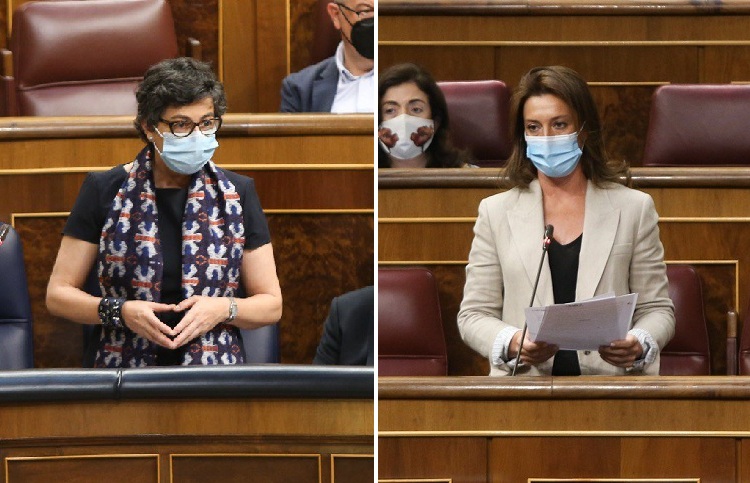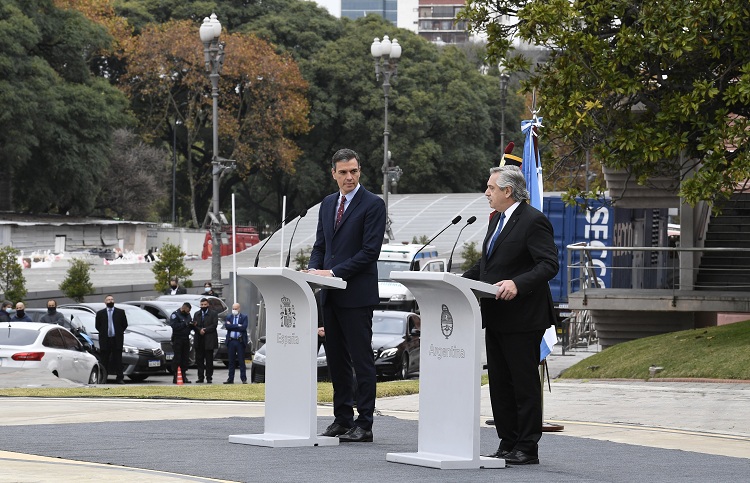The Diplomat
The Minister of Foreign Affairs, Arancha González Laya, was yesterday once again forced to address the diplomatic crisis with Morocco in the plenary session of the Congress, in which the PP accused her of having “made Spain irrelevant in the EU, in the US, in Latin America and in North Africa”.
González Laya intervened in the session of control to the Government in the Congress to answer two questions related to Morocco and Western Sahara. In the first place, the Foreign Affairs spokeswoman of the PP, Valentina Martínez Ferro, asked if “the Minister of Foreign Affairs considers that she is satisfactorily resolving the crisis opened between the Government of Pedro Sánchez and the Kingdom of Morocco”.
Likewise, the opposition MP held the minister directly responsible for having authorized the entry into Spain of the leader of the Polisario Front, Brahim Ghali, and for having wanted to “shelve” the matter “emulating the success of the ‘operation Delcy’, a botched job typical of amateurs and not of a Minister of Foreign Affairs”. “We are not asking her to solve the crisis” with “her discreet diplomacy”, since “she does not give a stitch without a mess”, she continued. “We ask you to stop making a fool of yourself, believing that you are deceiving us when what is happening is that you are the one who does not know anything. Can you tell us what is happening with Spanish foreign policy?“, continued Martínez Ferro.
“Mrs. Laya, you were coming to bring Spain back, but you have managed to make Spain irrelevant in the EU, in the US, in Latin America and in North Africa”, she denounced. “You have squandered our credibility and have turned it into weakness”, assured the MP, who recalled, as two examples of her arguments, that the European Council has not expressed its support for Spain in the crisis with Morocco or that the US president, Joe Biden, has not yet contacted the head of the Executive, Pedro Sánchez.
In her answers, González Laya reiterated his usual argument that Spain wishes to continue developing its relationship and cooperation with Morocco, which has been “exemplary in many areas” and “beneficial for both countries” and which will continue to bear “fruit” in the future. She also assured that “the Government has neither sought nor fueled a crisis between Spain and Morocco” and, therefore, its objective is “to look to the future and with dialogue”. Apart from this, the Minister asked the PP to “work for the common good of the Spanish people” by means of “a return to State policy”.
Subsequently, the MP Jon Iñarritu, of Bildu, asked the minister if Spain reaffirms its support for the UN and the self-determination of Western Sahara and demanded that the government recognize the Saharawi Arab Democratic Republic (SADR) and “be actively involved” both in the defense of the self-determination of the Saharawis and in the effective exercise of this right.
In his reply, González Laya returned to his usual arguments and assured that “the position of Spain with regard to the Sahara is a state policy, that is why it is constant, has not changed this government and frankly will not change because it is anchored in inalienable principles such as the defense of multilateralism and respect for international law, both pillars of foreign action”. This position of Spain, she added, is not different from the United Nations resolutions on the Sahara, in which Morocco’s sovereignty over this former Spanish territory is not recognized. “This is the position that Spain supports, this is what it has been and this is what it is going to be”, she assured.
Morocco accuses Spain of Europeanising the crisis
Meanwhile, the Moroccan Minister of Foreign Affairs, Nasser Bourita, affirmed yesterday that the Spanish government “is trying to Europeanise a crisis that is bilateral” between Morocco and Spain and that “did not end on 1 June” with the departure from Logroño of the Sahrawi leader Brahim Ghali, reports Efe.
“The crisis is there because its root causes continue”, continued Bourita, who expressed himself in this way during an appearance before the press in Rabat, after the visit of his Hungarian counterpart, Peter Szijjarto.
On up to four occasions he repeated that “the crisis is bilateral” and “political”, while Spain “tries to Europeanise it and divert it from its known causes, which are increasingly recognised by more and more actors”, he said.
“Europeanising this crisis is a flight forward, a way of diverting attention”, Bourita pointed out, for whom “Morocco is satisfied with its relationship with the European Union and its multiform cooperation with it”.
The European Parliament will vote on Thursday on a motion on “the use of children by the Moroccan authorities in the migration crisis with Ceuta”, and the possibility that it constitutes a violation of the UN Convention on the Rights of the Child.







